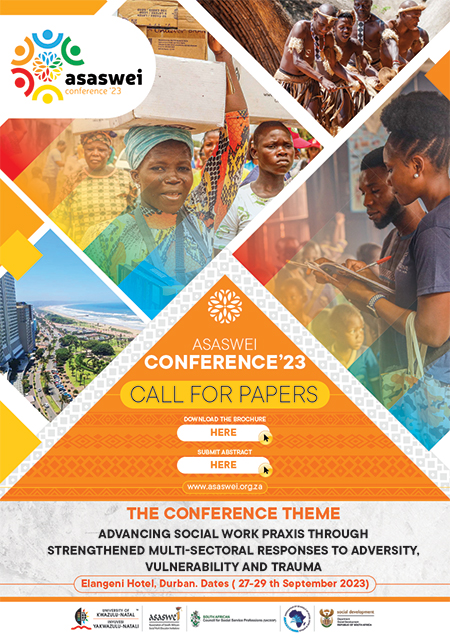Secondary tabs
The View page displays a submission's general information and data. Watch video
Submission information
Submission Number: 93
Submission ID: 125
Submission UUID: 2d0cc8bc-ff53-4256-b58d-cd0664db5796
Submission URI: /2023/abstracts
Created: Wed, 07/05/2023 - 11:01
Completed: Wed, 07/05/2023 - 11:11
Changed: Fri, 07/14/2023 - 09:59
Remote IP address: 13.244.201.93
Submitted by: Anonymous
Language: English
Is draft: No
Current page: Complete
Webform: Abstract
Presenters
Mr.
Ntloko
Nkqubela Aphiwe Jackson
Nelson Mandela University
Nkqubela Aphiwe Ntloko is a Social Worker registered with the SACSSP. He possesses a Bachelor of Social Work (BSW), B.A. Honours in Development Studies and Master of Social Work (MSW) research, all from Nelson Mandela University.
Nkqubela is a social activist, acutely sensitised to marginalised communities' structural issues, having grown and working in these communities. He is committed to being a catalyst and an enabler in leading transformation and development with people in their lives from diverse South African communities. His PhD work will contribute to the decolonial discourse in social work.
Nkqubela is a social activist, acutely sensitised to marginalised communities' structural issues, having grown and working in these communities. He is committed to being a catalyst and an enabler in leading transformation and development with people in their lives from diverse South African communities. His PhD work will contribute to the decolonial discourse in social work.
No
Abstract
Black African social workers' historical and contemporary understanding of the social development approach.
THEME 4: Quality management and enhancement of social services
SUB 4.4 Advancing Decolonial and Afrocentric education, research, and practice
Oral Presentation
Colonialism and apartheid influenced South African social welfare policies. After 1994, democratic laws like the White Paper for Social Welfare were implemented. However, poverty, unemployment, and inequality still marginalise most South Africans. This study (PALAR) uses participatory action learning action research to develop a social work practice approach for African social systems in South Africa—a critical, transformational, and democratic research method.
This paper reports on one objective, to understand social workers, and social work educators' historical and contemporary conceptualisations of the social development approach, focusing on Black African social workers.
Preliminary findings suggest that social development in South Africa fails to address structural inequalities like race and land, leading to large-scale poverty and unemployment. The approach is welfarist, disempowering, and insensitive to African culture. It also fails to consider the holistic needs of African clients and is not community-based. Social development services are not adequately integrated. South African social work needs to be reimagined.
This paper reports on one objective, to understand social workers, and social work educators' historical and contemporary conceptualisations of the social development approach, focusing on Black African social workers.
Preliminary findings suggest that social development in South Africa fails to address structural inequalities like race and land, leading to large-scale poverty and unemployment. The approach is welfarist, disempowering, and insensitive to African culture. It also fails to consider the holistic needs of African clients and is not community-based. Social development services are not adequately integrated. South African social work needs to be reimagined.
Reviewer ONE Feedback
{Empty}
{Empty}
{Empty}
Yes
Empirical Research
Accepted
Reviewer TWO Feedback
Dr
Peggie
Chiwara
Yes
Empirical Research
Accepted

